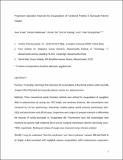Progressive Saturation Improves the Encapsulation of Functional Proteins in Nanoscale Polymer Vesicles
Author(s)
Yewle, Jivan; Wattamwar, Paritosh; Tao, Zhimin; Ostertag, Eric M.; Ghoroghchian, P. Peter; Ghoroghchian, Paiman Peter; ... Show more Show less
Download11095_2015_1809_ReferencePDF.pdf (1.983Mb)
PUBLISHER_POLICY
Publisher Policy
Article is made available in accordance with the publisher's policy and may be subject to US copyright law. Please refer to the publisher's site for terms of use.
Terms of use
Metadata
Show full item recordAbstract
Purpose
To develop a technique that maximizes the encapsulation of functional proteins within neutrally charged, fully PEGylated and nanoscale polymer vesicles (i.e., polymersomes).
Methods
Three conventional vesicle formation methods were utilized for encapsulation of myoglobin (Mb) in polymersomes of varying size, PEG length, and membrane thickness. Mb concentrations were monitored by UV–Vis spectroscopy, inductively coupled plasma optical emission spectroscopy (ICP-OES) and by the bicinchoninic acid (BCA) assay. Suspensions were subject to protease treatment to differentiate the amounts of surface-associated vs. encapsulated Mb. Polymersome sizes and morphologies were monitored by dynamic light scattering (DLS) and by cryogenic transmission electron microscopy (cryo-TEM), respectively. Binding and release of oxygen were measured using a Hemeox analyzer.
Results
Using the established “thin-film rehydration” and “direct hydration” methods, Mb was found to be largely surface-associated with negligible aqueous encapsulation within polymersome suspensions. Through iterative optimization, a novel “progressive saturation” technique was developed that greatly increased the final concentrations of Mb (from < 0.5 to > 2.0 mg/mL in solution), the final weight ratio of Mb-to-polymer that could be reproducibly obtained (from < 1 to > 4 w/w% Mb/polymer), as well as the overall efficiency of Mb encapsulation (from < 5 to > 90%). Stable vesicle morphologies were verified by cryo-TEM; the suspensions also displayed no signs of aggregate formation for > 2 weeks as assessed by DLS. “Progressive saturation” was further utilized for the encapsulation of a variety of other proteins, ranging in size from 17 to 450 kDa.
Conclusions
Compared to established vesicle formation methods, “progressive saturation” increases the quantities of functional proteins that may be encapsulated in nanoscale polymersomes.
Date issued
2015-10Department
Koch Institute for Integrative Cancer Research at MITJournal
Pharmaceutical Research
Publisher
Springer US
Citation
Yewle, Jivan, Paritosh Wattamwar, Zhimin Tao, Eric M. Ostertag, and P. Peter Ghoroghchian. “Progressive Saturation Improves the Encapsulation of Functional Proteins in Nanoscale Polymer Vesicles.” Pharmaceutical Research 33, no. 3 (October 27, 2015): 573–589.
Version: Author's final manuscript
ISSN
0724-8741
1573-904X